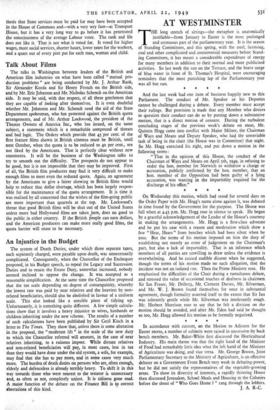An Injustice in the Budget
The system of Death Duties, under which three separate taxes, each separately charged, were payable upon death, was unnecessarily complicated. Consequently, when the Chancellor of the Exchequer proposed, in his Budget speech, to repeal the Legacy and Succession Duties and to retain the Estate Duty, somewhat increased, nobody seemed inclined to oppose the change. It was accepted as a reasonable simplification. At the same time the Chancellor proposed that the tax scale depending on degree of consanguinity, whereby the lowest rate was paid by near relatives and the heaviest by non- related beneficiaries, should also be abolished in favour of a uniform scale. This also looked like a sensible piece of tidying up. Unfortunately, it is something quite different. A few simple calcula- tions show that it involves a heavy injustice to wives, husbands or children inheriting under the new scheme. The results of a number of such calculations have been published by Sir Cecil Kisch in a letter to The Times. They show that, unless there is some alteration in the proposal, the " moderate lift " in the scale of the new duty to which the Chancellor referred will amount, in the case of near relatives inheriting, to a ruinous impost. While distant relatives and non-related beneficiaries will pay, in most cases, less in tax than they would have done under the old system, a wife, for example, may find that she has to pay more, and in some cases very much more. The burden of death duties on persons who are, often enough, elderly and defenceless is already terribly heavy. To shift it in this way towards those who were nearest to the testator hi unnecessary and, as often as not, completely unjust. It is tidiness gone mad. A major function of the debate on the Finance Bill is to correct aberrations of this kind.


































 Previous page
Previous page